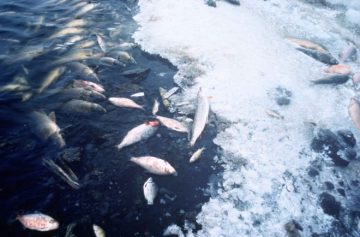When most of us think about the list of impacts of climate change on our oceans, rising sea levels, warming waters, and ocean acidification are at the top. Nereus Director of Science William Cheung (UBC) and OceanCanada Director and Nereus Research Associate (Honourary) Rashid Sumaila (UBC) recently co-authored a review paper in Global Change Biology that explored an unexpected but important climate change-related stressor in our oceans: marine contaminants.
The paper proposes that climate change will alter the effects of pollutants in marine food webs by either directly increasing contaminant exposure (for instance due to receding ice caps), or making organisms more vulnerable to other climate change impacts. It discusses two main classes of contaminants that can affect the health of marine organisms: fat-soluble contaminants known as persistent organic pollutants (POPs), and protein-binding contaminants such as methylmercury (MeHg). Though several of these contaminants were phased out in the 1970s, they continue to be cycled through marine food webs, and according to the authors have the most significant impacts on marine biodiversity.
